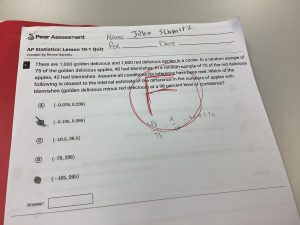Do Grades Measure Intelligence?
December 13, 2022
You get a C on your math test, you feel like a failure. You thought you studied enough but that’s not what the paper shows. It’s not the worst you’ve done but it certainly isn’t the best. You know you aren’t dumb because you understand two languages, can play three instruments, and learn new recipes all the time and execute them perfectly. So why is it so hard for you to get an A on a math test? Didn’t fully comprehend the topic? Have other things on your mind that’s distracting you? There can be several reasons why, but not getting an A on a test does not determine how “smart” you are as a person.
I was interested in getting some opinions from teachers to see if they believed grades measure intelligence. I spoke with Mr. Brodeur, a history teacher at New Providence High School, who said:“Grades can be an accurate measure of effort or interest. If you are interested in something you’re most likely to get a better grade. But not intelligence, intelligence could mean a lot of different things. You could be intelligent in music, and your history grade will never show that.”
I also asked Mr. Klein, the psychology teacher in New Providence High School what his opinions were on this topic. He believes that the word intelligent is misused and has more than one meaning.
“People tend to think of intelligence as something that is concrete. That’s something that is measurable, something that is real, but psychologists think of it as a construct. It’s something that is made up of a lot of different things, but it’s hard to put all together into one thing that we call intelligence. Okay, so when you use the term intelligence that itself is really it’s kind of a misuse of it, right? Because it depends on which theorist you’re going with there. There might be multiple intelligences. So it’s a long way around saying that grades do not determine intelligence and intelligence doesn’t determine grades,” he explained.
Sometimes students struggle with understanding material. Other times they just give up because they feel like it’s not worth the effort. It’s hard for teachers to tell if a student isn’t trying versus doesn’t understand the material.
“That’s really hard to tell because sometimes when students don’t understand, sometimes they shut down, and they don’t ask for help. And they just give up they’re like, oh my god, I’m just never going to be good at math. And I think I know that from experience because I think as a student, sometimes I did that. Rather than seeking out help. I just said, No, I’m just not good at math. And I think that seeking out help comes with maturity. And that’s hard for kids,” Mr. Brodeur said.
Maybe students are scared to reach out for help because they are too far behind and don’t think it’s possible to get on track, or maybe they’re embarrassed. There’s a lot of factors that can contribute to this. Just because it takes someone longer to learn something or it requires them more effort does not make them “dumb”. Some kids simply need more time to learn or get assignments done because they can’t do it as fast as others. When teachers see this, do they think it’s reasonable to be flexible with the student?
Mr. Klein explained his view on this: “I try to be flexible with students, but you know, the old expression that everything is in moderation, even moderation. I think it applies here so that you have to be flexible, but at the same time, sometimes you have to draw clear lines, because students know how to break the system and take advantage of flexibility and end up not getting anything done.”
There are so many examples of kids who dropped out of school because it wasn’t for them and still became successful. This made me wonder what would make a student “intelligent” or educated but not an A student.
“One thing is motivation. They have to want to do well on a course and they have the motivation for it. It could be internal motivation, they just are interested in it and love the subject. Or they might be motivated solely by grades. Or there could be other external ones too. The ones who typically understand and learn at best are the ones who have that internal motivation. It’s something that they find interesting and every student is not going to find every subject interesting,” Mr. Klein said.

















